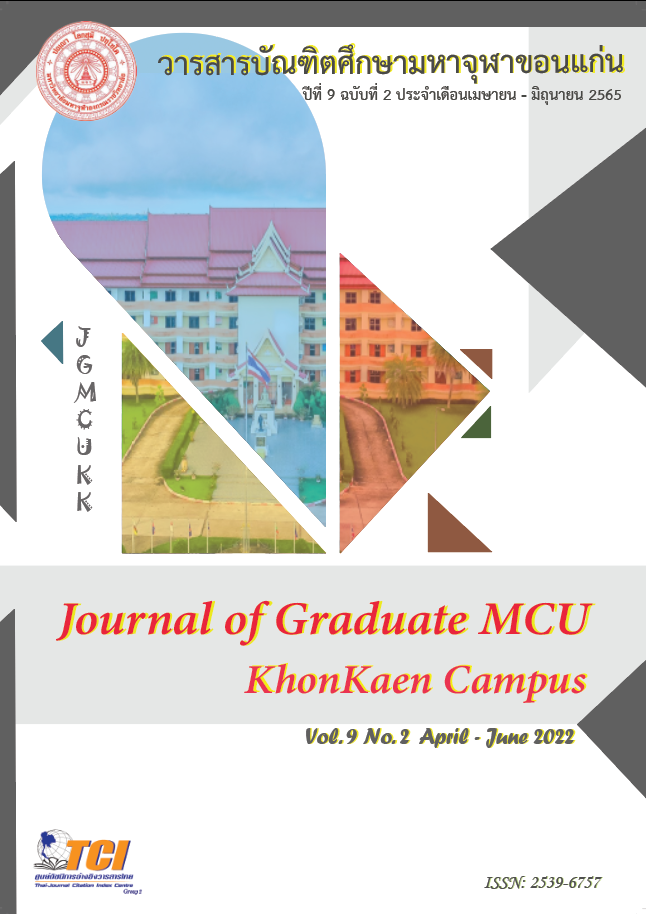The Treatment of the Deceased from the Coronavirus Disease 2019 is Based on Buddhist Ethics The Treatment of the Deceased from the Coronavirus Disease 2019 is Based on Buddhist Ethics
Main Article Content
Abstract
Coronavirus 2019 infection is the five aspects of natural law when there is a loss of a family member due to the death of corona virus 2019, the implementation of the Buddhist Ethics Principles of Four Sublime States of Mind or unbounded states of mind are spread evenly among all beings, there is no limit, there is no limit to the extent of Four Sublime States of Mind. would cause that person to act in favor of others to alleviate the suffering of relatives who lost loved ones As for the deceased, they were given care to the last elemental Khan and mind. By cooperating with houses, temples, and hospitals in the complete management of cremation according to religious beliefs including reducing the spread the infection to create safety in society
Article Details

This work is licensed under a Creative Commons Attribution-NonCommercial-NoDerivatives 4.0 International License.
References
กระทรวงสาธารณสุข. (2565). ข้อมูลผู้ติดเชื้อและผู้เสียชีวิตเชิงวิเคราะห์รายจังหวัด. สืบค้นเมื่อ 2 มีนาคม 2565, จาก https:// ddc.moph.go.th/covid19-ashboard/?dasboard=analysis-provice
กรมควบคุมโรค. (2563). คู่มือเจ้าหน้าที่สาธารณสุขในการตอบโต้ภาวะฉุกเฉิน กรณีการระบาดโรคติดเชื้อไวรัสโคโรนา 2019 ในประเทศไทย. นนทบุรี: บริษัท ทีเอส อินเตอร์พริ้น จำกัด.
กระทรวงสาธารณสุข. (2563). แนวทางปฏิบัติด้านสาธารณสุข เพื่อการจัดการภาวะระบาดของโรคโควิด-19 ในข้อกำหนดออกตามความในมาตรา 9 แห่งพระราชกำหนดการบริหารราชการ ในสถานการณ์ฉุกเฉิน พ.ศ. 2548 (ฉบับที่ 1). นนทบุรี: บริษัท ทีเอส อินเตอร์พริ้น จำกัด.
แก้ว ชิดตะขบ. (2547). รวมวิชาธรรมศึกษาชั้นตรี (ตามหลักสูตรของสนามหลวงแผนกธรรม พ.ศ. 2546). กรุงเทพฯ: โรงพิมพ์การศาสนา.
กรมวิทยาศาสตร์การแพทย์. (2564). คู่มือการตรวจวินิจฉัยโรคติดเชื้อไวรัสโคโรนา 2019 COVID-19) ทางห้องปฏิบัติการ. สืบค้นเมื่อ 27 ธันวาคม 2564, จาก https://www3.dmsc.moph.go.th/post-view/680
กรมการแพทย์, แนวทางเวชปฏิบัติ การวินิจฉัย ดูแลรักษาและป้องกันการติดเชื้อในโรงพยาบาล กรณีโรค ติดเชื้อไวรัสโคโรนา 2019 (COVID-19). สืบค้นเมื่อ 27 ธันวาคม 2564, จาก http://covid19.dms.go.th/backend///Content//Content_File/Covid_Health/Attach/25631019115
AM_CPG_COVID_18%20Oct-2020-NS_formatted. Pdf
กรมควบคุมโรค. (2564). คำแนะนำการใช้อุปกรณ์ส่วนบุคคลป้องกันการติดเชื้อ. สืบค้นเมื่อ 27 ธันวาคม 2564, จาก https://ddc.moph.go.th/viralpneumonia/file/g_health_care/g07_ppe.pdf)
กรมการแพทย์, แนวทางปฏิบัติในการดูแลผู้ป่วยวิกฤตในสถานการณ์การระบาดของ COVID-19. สืบค้นเมื่อ 27 ธันวาคม 2564, จาก https://covid19.dms.go.th/backend/Content/Content_ File/Covid_Health/Attach/25630526135005PM_%E0%B8%9B%E0%B8%A3%E0%B 8%B0%E0%B8%81%E0%B8%B2%E0%B8%A8%20ICU%20COVID19%20update(1).pdf
สุวรรณชัย วัฒนายิ่งเจริญชัย. (2564). กรมอนามัยแนะ 3 แนวทางจัดการศพติดเชื้อโควิด -19 อย่างปลอดภัย. สืบค้นเมื่อ 27 ธันวาคม 2564, จาก https://multimedia.anamai.moph.go.th/news/270764-2/
สำนักงานป้องกันควบคุมโรคที่ 7 ขอนแก่น. เอกสารประกอบการประชุม EOC เขตสุขภาพที่ 7 ครั้งที่ 41/2564. สืบค้นเมื่อวันที่ 2 มีนาคม 2565, จาก http://www..net/wp-content/uploads/2021/11/สคร-7Covid-DPC7KK_เขต-16-Nov-021_edit.pdf
ธีรโชติ เกิดแก้ว. (2563). การปรับตัวและการร่วมมือกันในสถานการณ์โควิด 19 ตามแนวพุทธศาสน์. วารสารบัณฑิตศึกษาปริทรรศน์, 16(2), 59-78.
ภาณุวัฒน์ ชุติวงศ์. รู้และเข้าใจแนวทางจัดการศพผู้ป่วยโควิด -19 ตามมาตรฐานของโรงพยาบาลจุฬาลงกรณ์ สภากาชาดไทย. สืบค้นเมื่อ 29 ธันวาคม 2564, จาก https://www.kkpho.go.th/I2021/index.php/component/attachments/download/10087
พระเทพวัชรบัณฑิต. หลักจริยศาสตร์ในคัมภีร์พระพุทธศาสนา. สืบค้นเมื่อ 2 มกราคม 2565, จาก https://www.mcu.ac.th/ article/detail/35388
พระไพศาล วิสาโล. (2558). เหนือห้วงมหรรณพ คำสอนทิเบตเพื่อเตรียมตัวตายและช่วยเหลือผู้ใกล้ตาย. (พิมพ์ครั้งที่ 5). กรุงเทพฯ: มูลนิธิโกมลคีมทอง.
พระพรหมคุณาภรณ์ (ป.อ. ปยุตฺโต). (2559). พจนานุกรมพุทธศาสตร์ ฉบับประมวลธรรม. (พิมพ์ครั้งที่ 34). กรุงเทพฯ: มูลนิธิการศึกษาเพื่อสันติภาพ พระธรรมปิฎก (ป.อ.ปยุตฺโต).
พระพรหมคุณาภรณ์ (ป.อ.ปยุตฺโต). (2546). พจนานุกรมพุทธศาสตร์ ฉบับประมวลธรรม. (พิมพ์ครั้งที่ 12). กรุงเทพฯ: มูลนิธิการศึกษาเพื่อสันติภาพ พระธรรมปิฎก (ป.อ.ปยุตฺโต).
สมเด็จพระศรีนครินทราบรมราชชนนี. (2539). รวมธรรมะ. กรุงเทพฯ: อมรินทร์พริ้นติ้ง แอนด์ พับลิชชิ่ง.
พระปัญญา นันทภิกขุ. (2561). หน้าที่ผู้บังคับบัญชา หน้าที่ผู้ใต้บังคับบัญชา. สืบค้นเมื่อ 11 มกราคม 2565, จาก https://ebook.lib.ku.ac.th/ebook27/eBook/2016RG0103/#p=30
พระมหาบุญมี มาลาวิโร. (2553). พุทธบริหาร. นนทบุรี: บริษัท อิงค์บียอนด์บุ๊คส์ จำกัด.
WHO, Naming the coronavirus disease (COVID-2019) and the virus that causes it. Retrieved on 27 December 2021, from: https://www.who.int/emergencies/diseases/novel-coronavirus-2019/technical-guidance/naming-the-coronavirus-disease-(covid-2019)-and-the-virus-that-causes-it
World Health Organization, Q&A on coronaviruses (COVID-19). Retrieved on December 2021, from: https://www.who.int/emergencies/diseases/novel- coronavirus-2019/question-and-answers-hub/q-a-de-tail/ q-a-coronaviruses
Centers for Disease Control and Prevention, Coronavirus Disease 2019 (COVID-19). Retrieved on 27 December 2021, from: https://www.cdc.gov/coronavirus/2019-ncov/symp-toms-testing/symptoms.html
Centers for Disease Control and Prevention, Coronavirus Disease 2019 (COVID-19). Retrieved on 27 December 2021, from: https://www.cdc.gov/coronavirus/2019-ncov/specific-groups/people-at-higher-risk.html

